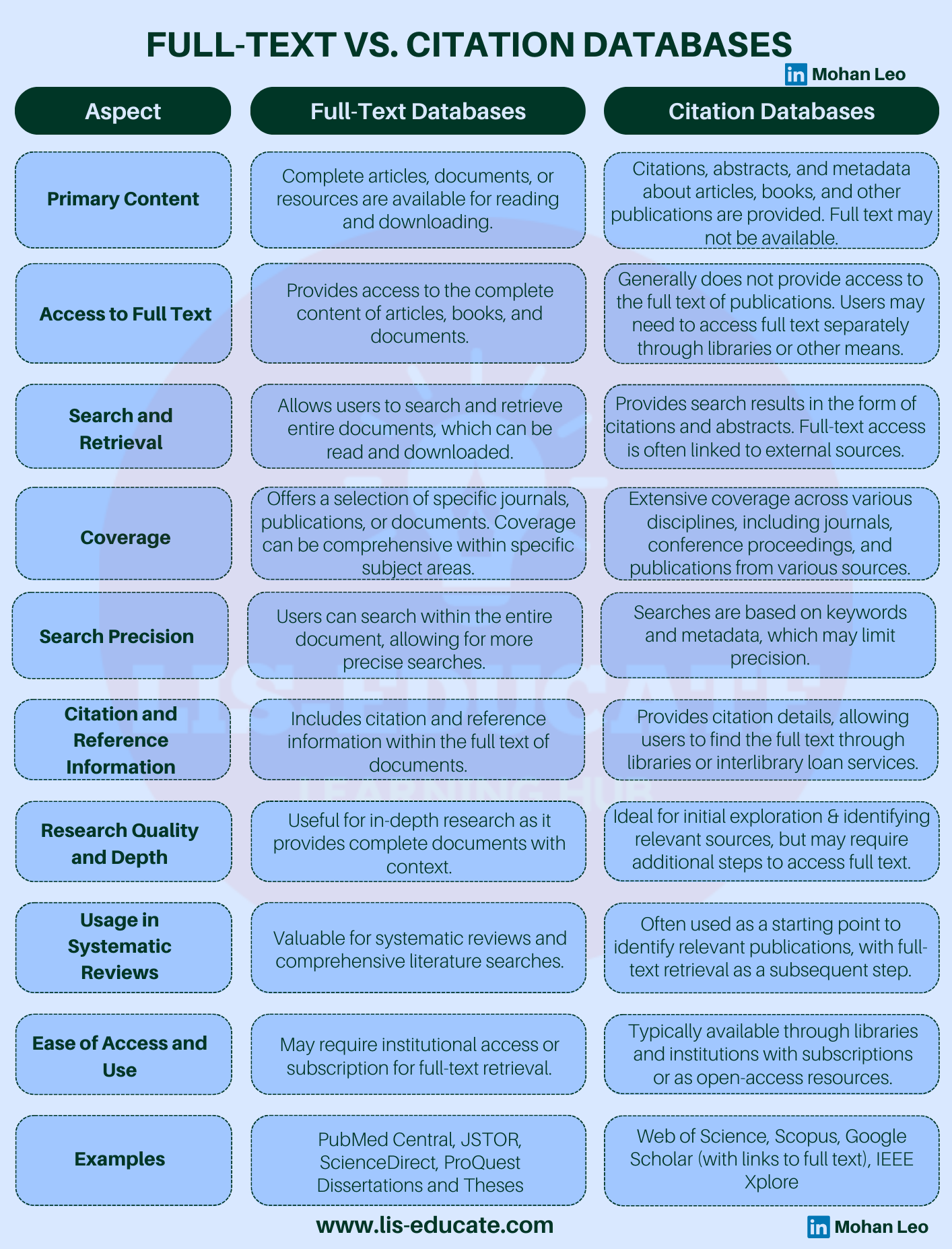Navigating Research Resources: Full-Text vs. Citation Databases
Introduction
In today's digital age, researchers are spoiled for choice when it comes to accessing scholarly information. Two types of databases stand out: full-text databases and citation databases. Each offers distinct advantages and serves different purposes in the world of research. In this article, we'll explore the differences between these two types of databases and how to make the most of each in your academic pursuits.
Full-Text Databases: A Treasure Trove of Content
Full-text databases are your go-to source when you need complete articles, documents, or resources at your fingertips. These databases provide the entire content of publications, making them a valuable resource for in-depth research. Here are some key characteristics of full-text databases:
Access to Full Text: As the name suggests, full-text databases give you direct access to the complete content of articles, books, and documents. This means you can read, download, and analyze the information from the database.
Search and Retrieval: Full-text databases allow you to search the entire document, enabling more precise searches and targeted information retrieval.
Coverage: These databases offer a curated selection of specific journals, publications, or documents. Within their chosen subject areas, they often provide comprehensive coverage.
Citation and Reference Information: Full-text databases include citation and reference information within the documents, allowing you to explore the research context.
Research Quality and Depth: Full-text databases are ideal for in-depth research, providing complete documents with all the necessary context and data.
Usage in Systematic Reviews: Researchers conducting systematic reviews and comprehensive literature searches often rely on full-text databases to access complete articles.
Ease of Access and Use: Access to full-text databases may require institutional access or subscription, but they are valuable resources for those who have it.
Some well-known examples of full-text databases include PubMed Central, JSTOR, ScienceDirect, and ProQuest Dissertations and Theses.
Citation Databases: The Gateway to Scholarly Information
Citation databases, on the other hand, offer a different approach to research. They don't provide full articles but offer citations, abstracts, and metadata about articles, books, and other publications. Here's what you need to know about citation databases:
Access to Full Text: Citation databases generally do not provide access to the full text of publications. Instead, they offer links or information about where to find the full text, often through libraries or interlibrary loan services.
Search and Retrieval: Searches in citation databases are based on keywords and metadata, which may limit precision compared to full-text databases.
Coverage: These databases have extensive coverage across various disciplines, including journals, conference proceedings, and publications from various sources.
Citation and Reference Information: They provide citation details, allowing you to identify relevant publications and find the full text when needed.
Research Quality and Depth: Citation databases are ideal for initial exploration and identifying relevant sources. Researchers typically use them as a starting point.
Usage in Systematic Reviews: While not the primary source for systematic reviews, citation databases can help identify relevant papers, which can be obtained in full text.
Ease of Access and Use: They are often available through libraries and institutions with subscriptions or as open-access resources.
Common examples of citation databases include Web of Science, Scopus, and Google Scholar (with links to full text).
A Table for Quick Comparison
To help you navigate the differences between full-text and citation databases, here's a table summarizing their key characteristics:
Conclusion
In the world of research, both full-text and citation databases have their roles to play. Full-text databases provide the depth needed for detailed analysis, while citation databases offer a gateway to a vast world of scholarly information. Depending on your research goals, you can leverage these databases to uncover valuable insights and sources that drive your academic journey forward.
💬 What’s your first stop for finding research? Share your thoughts in the comments!


